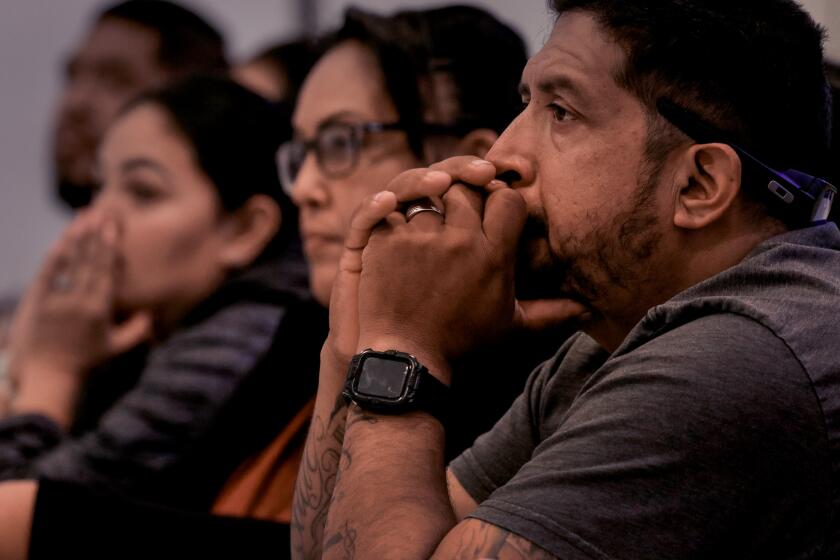A no-win vote
The late John Kenneth Galbraith might have had next week’s statewide special election in mind when he described politics as “choosing between the disastrous and the unpalatable.”
According to the most reliable California polls, the state’s voters already have chosen the former. All of the budget-balancing propositions that Gov. Arnold Schwarzenegger and the Legislature placed on the May 19 ballot appear headed for resounding defeat -- except the one allowing temporary cuts in lawmakers’ salaries.
The solid majority of voters is leaning this way even though it’s clear that rejection will set in motion a historic fiscal bloodletting with wholesale cuts in popular programs and vital services. To understand why so much of the electorate prefers this clear disaster, you have to understand just how unpalatable Californians find not only the budget initiatives but also the politicians who produced them.
The most recent survey by the nonpartisan Public Policy Institute of California found that Schwarzenegger’s approval rating among likely voters is at a low of 34%. More than half of all Republicans, Democrats and independents disapprove of the job the governor is doing. The Legislature fares even worse: 80% of likely voters disapprove of the job it’s doing, while just 12% approve.
There’s an even more corrosive finding in the poll. For the last five years, its survey has asked this question: “Would you say that state government is pretty much run by a few big interests looking out for themselves, or is it run for the benefit of all the people?” This time, 76% of the respondents who are likely voters said they believe that special interests call the tune in Sacramento. And the truth is, they’re right.
Corporate income taxes contribute just 11% of the state’s annual revenues. Sales and use levies generate 35%. One of the reasons California’s revenue picture is so catastrophic is that Sacramento now depends on the personal income tax for more than 50% of its annual income.
Personal income is extraordinarily vulnerable to the vagaries of the business cycle because recessions increase unemployment, and downturns squeeze the high-income earners, who pay a disproportionate share of the income tax. Last year, collections on capital gains fell 55%, and probably will decline 10% more this year. The governor’s budget people project that sales taxes will fall 15%, while property taxes will decline 4%.
What’s most distasteful about the package of budget compromises is that Schwarzenegger and the legislators spared many of the most powerful special interests any responsibility for helping Californians cope with this crisis. The major financial backers of the budget initiatives are the interests that got their way in the negotiations -- Indian casinos and a major teachers union, and businesses that blocked any new taxes on their operations.
Major oil companies are among the measures’ biggest backers -- Chevron has given $500,000 and Occidental $250,000 -- as are liquor and beer distributors and vintners, such as E&J; Gallo ($100,000), and pro sports franchises, which killed a proposed ticket tax. (Anschutz Entertainment Group, which owns Staples Center and is developing LA Live, has given $125,000 and the Lakers and Clippers $25,000 each.)
The obvious cynicism of this quid pro quo is not lost on voters, an overwhelming majority of whom told the Public Policy Institute that they are pessimistic about the California economy. In fact, just 16% of likely voters told the pollsters they trust Sacramento to do the right thing most of the time.
The problem here is that even though voters are drawing rational conclusions about Sacramento’s incompetence and malfeasance, the reaction they’re choosing is self-destructive. After these measures fail and Schwarzenegger and the Legislature begin to hysterically close a looming shortfall of more than $20 billion, they won’t eliminate the obscure board that regulates Shasta County beekeepers and provides comfortable incomes for their old political cronies. They’ll go after the programs that fund local government services, because what Sacramento does best is pass the pain.
Thus, Mayor Antonio Villaraigosa -- who on Tuesday asked the L.A. City Council to declare a fiscal emergency to cope with a budget shortfall that may exceed $1 billion next year -- has been told by his staff that the ballot measures’ failure may lead Sacramento to withhold as much as $76 million in sales tax revenues.
L.A. County Supervisor Zev Yaroslavsky says rejection of the measures may cost the county, which provides most essential human services, several hundred million dollars. “Children, the poor, the elderly and the sick are the most politically marginalized members of our society. They don’t vote and they don’t make the contributions the special interests do.”
The paradox, Yaroslavsky points out, is that the need for services is rising dramatically, while Sacramento seems likely to make draconian cuts in funding. The number of county residents receiving general relief, for example, has risen 1.5% in each of the last 18 months.
The question for voters, then, is this: Is it worth “sending Sacramento a message” when the people who ultimately are on the receiving end are our neediest and most vulnerable neighbors?
More to Read
Get the L.A. Times Politics newsletter
Deeply reported insights into legislation, politics and policy from Sacramento, Washington and beyond. In your inbox three times per week.
You may occasionally receive promotional content from the Los Angeles Times.










